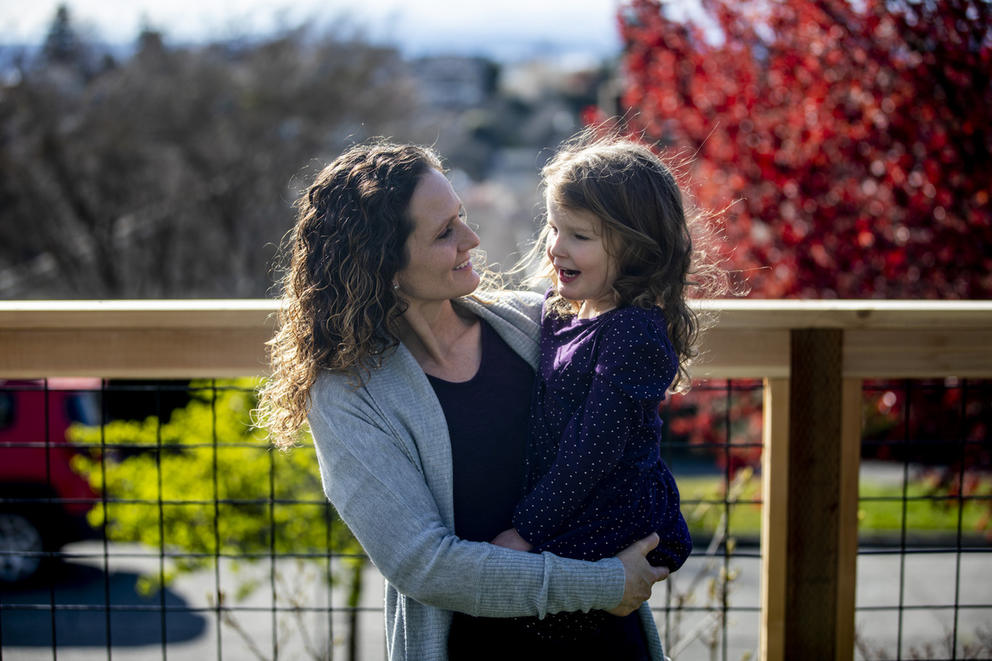Sarah was nicely on track toward kindergarten, with programs getting her prepped while looping in a team of therapists and professionals to create a plan for her development along the way. Orchard had been paving this path for Sarah since she was 8 months old and first diagnosed with a genetic disorder.
Then, her school closed. The coronavirus outbreak forced it and every other public and private school in the state to shut their doors and begin figuring out how to instruct students at home. That closure has since been extended until the end of the 2019-2020 school year.
Now, Orchard is at a loss. Suddenly, all the support she had gathered over the years and her plans for her daughter seem to have dissipated.
“It’s like going through the process of grief again,” she said. “We thought we had everything set up and we had all this help, and I don’t have it anymore.”
While this school year has ended in chaos for families across the nation, students with special needs find themselves in truly uncharted territory. Breaks such as summer vacation usually haven’t meant a pause in assistance for students with disabilities; many can seek help even during those breaks. But school closures and social distancing are making most of that help nearly impossible to deliver.
More COVID-19 education help: Emergency child care for Washington families
School districts all over the state are scrambling to put together lesson plans for students and tending to family needs while figuring out what this might mean for next year. The state Office of Superintendent of Public Instruction has advised school districts to reach out to families, assess their needs and do what they can.
While the OSPI website states that schools aren't obligated to provide special education services if they’re not providing educational services to all students during a closure, districts are encouraged to assess special education needs case by case. A bulletin sent out March 23 encouraged schools to be flexible and try different approaches during what is, for everyone, an uncertain time in education.
Glenna Gallo, OSPI's assistant superintendent of special education, said she is advising school districts with the expectation that they’re going to be running differently than before.
“School districts are in a variety of places right now and they’re not all the same, nor is there an expectation that they are,” Gallo said.
While sending lesson plans home might work for some, many parents in Orchard’s situation are at a loss. Orchard said she’s not equipped to take on her daughter’s education on her own. Even if she’s asked what she needs, she says she doesn’t “know what to ask for because I don’t know what the solution is.”
Thinking of her daughter’s placement next year, Orchard worries it possibly would be in a class her daughter wouldn’t have been in if she’d gotten the service she needed. That scares her.
“It’s my daughter whose life is going to be affected by this, possibly for a long time,” Orchard said. “If she gets put [in a class] just because we didn’t try, we didn’t do what she needed … that’s a lot harder to come to terms with.”
Flying while building the plane
Even before the pandemic, getting help for students with disabilities was hard. Amy Campbell, a special education teacher in the Camas School District, said inclusion and equity for these students have long been a work in progress — in Washington and the rest of the country. So when Campbell feels school districts across the country are focusing on what they can’t do for these students, she thinks they should flip their thinking and do what special education has always done: focus on what can be done with the resources a district has.
“We’ve been flying a plane as we assemble it for years,” Campbell said. “We cannot give up. We just need to keep flying this plane and assembling as we go.”
For children with special needs, cutting school out of the picture means a disrupted schedule, which can cause a child’s progress to halt entirely or even regress. Amy Skogen’s 10-year-old son had two behavioral therapists and access to multiple other services while in school. Now, without that help and consistency, Skogen has seen an uptick in her son’s aggressive behavior.
Like Orchard, Skogen had plans for her child. She had long been considering a residential home for her son, where he’d have constant access to necessary care. After two years of work toward that goal, she found the right place. He was supposed to get his spot within these past few weeks. The pandemic put that on hold.
“It’s devastating,” Skogen said. “We’re struggling to keep him safe, and our family safe.”
Skogen has received help in connecting to services through attorneys working with Disability Rights Washington. The statewide organization joined other organizations in sending a letter to OSPI on March 19, asking that the agency provide further instruction to school districts to ensure students with disabilities are connected with necessary services even when school buildings are closed.
Families are struggling to make life work with what they have. Andrea Kadlec, an attorney with Disability Rights Washington, said that information changes from week to week, sometimes day to day.
On Tuesday, OSPI released its most detailed guidance to date for families and districts seeking help for students with disabilities. Guidance for general education was released Monday, and this consecutive packet walks through the details of special education needs like accommodations or modifications for students if in-person service isn’t possible.
With this week's announcement that school facilities will be closed for the rest of the school year, OSPI's Gallo said this guidance can provide a framework for continued education. She said there’s also an expectation that districts will continue to develop and refine special education services as more information becomes available. She encouraged families to reach out to districts for support.
Disability Rights Washington has emphasized that these services go beyond just education. It’s often a matter of safety, too.
C.G., who asked that she go by her initials and who cares for her 12-year-old grandson, Chris, said the lack of services for Chris, who is autistic, have changed their family life completely. Chris had multiple therapists in school, as well as an outlet for his boundless energy, which is now further limited by social distancing measures. He’s fallen back on old behaviors, such as taking off from the house unsupervised.
“They did send him a packet home but due to disruption in his schedule, there’s not a lot of getting him sitting and complying with paperwork,” she said. “I don’t see him getting a lot of that done.”
C.G. knows schools won’t be opening anytime soon, but she wonders if there could be temporary fixes. Could gyms open for a limited number of people who need physical activity, like Chris, to function?
C.G. received a call from Chris’s school, but she said it was mostly just a check-in. When asked how the school could help, she said she didn’t know what to say. What could be done? Her grandson needs services he can’t get right now and she doesn’t know what to do. All she knows is that the situation is starting to become impossible to manage.
“It can almost get dangerous when you have this level of behavior and no outlets,” C.G. said. “I just wish there was something we could do.”
Ashley Greenberg, an attorney representing C.G. and Skogen who is also working with other families in similar situations, said this is the case many others face.
“This is going to build more and more as families are finding it harder and harder to cope without those behavioral supports they had,” said Greenberg.
Equity, access and doing what you can
Orchard has continued to juggle changes in her world with educating her 5-year-old daughter. The other day, the two of them sat down to work on writing, but it was a struggle to get Sarah to write her name. Orchard had received an email from Sarah’s teacher listing links and resources for students, adding that parents could reach out with questions. But amid the chaos of every other life change, it felt overwhelming. She scrolled through the email, but wasn’t sure where to even begin.
Since then, Orchard has reached out to other parents, asking them how they’re doing and what guidance they’ve received from their school or district. While she’s heard general sentiments about all students needing to catch up together, she said she knows it’s different for children like hers who depend on school for more than basic education.
Jeffrey Neiss, executive director of specialized student services at Educational Service District 112 in Vancouver, Clark County, said he saw some schools that were nervous about providing robust general education instruction during the shutdown in fear that they’d push special education to the side when this began. Since then, he said messaging from himself and OSPI has focused on telling districts to keep pushing. In his district, staff created a spreadsheet of families to call.
Gallo said that while the need for compensatory services for students once schools reopen is probable, an assessment of the needs won’t be fully possible until that time comes.
For now, the focusing is on contacting families, understanding their needs and meeting them however possible. While OSPI is working to add more structure, Neiss said the general directive has been this: Do the best you can.
“Let’s not wait to see what each district is offering all of its students,” he said. “Let’s do the best we can with what we have.”
Robin Lake, director of the Center on Reinventing Education at the University of Washington, said that while she hasn’t seen many concrete plans nationally for students with disabilities, teachers and schools have tried some creative solutions for distance learning. As those plans develop, she said it’s helpful to reach out to your child’s teacher, if possible, and figure out an individualized plan.
“Every child is unique and every learning strategy has to be unique,” Lake said. You won’t find a perfect solution, especially for children who can’t get their needs met remotely, but working directly with your child’s teacher is probably one of the best options for now.
Some special education teachers are working to do what they can remotely. The Camas district's Campbell started a YouTube channel for her special needs students, with an aim to teach the children while also providing behavioral strategies for parents. She and others have also come together and created a website for families of children with disabilities, providing tips and resources for distance learning.
She knows it’s not the same — nothing can measure up to the in-person aid parents were receiving while in school. But she is trying to do what she can. A classroom, Campbell said, teaches students they belong in their community, that they’re viable, that they’re worth it.
“We must not give up on our efforts towards equity and access,” she said. “We’re teaching our children and the whole world that education should happen for everyone.”
Educational programming is available on KCTS 9.4 (WORLD Channel) and on our resource guide for teachers, home schoolers, and educators of all types in this out-of-the-classroom environment.



